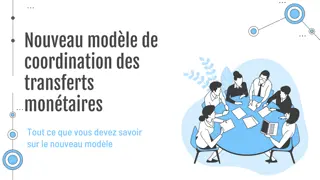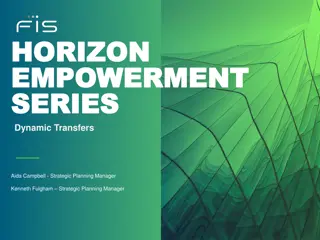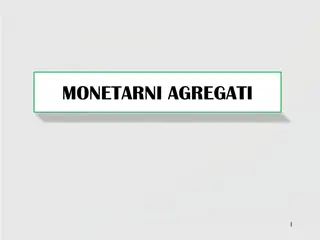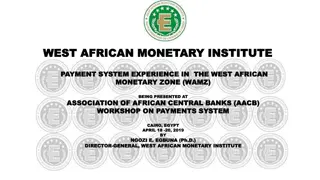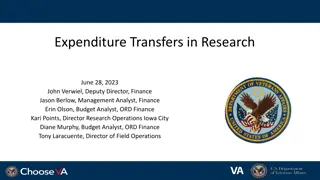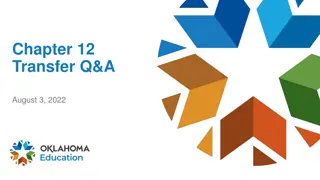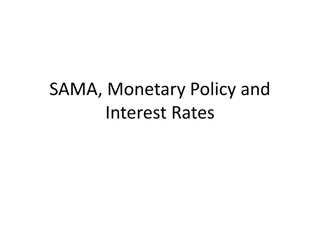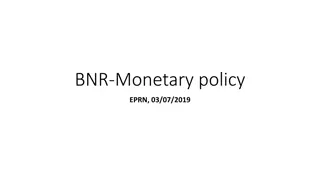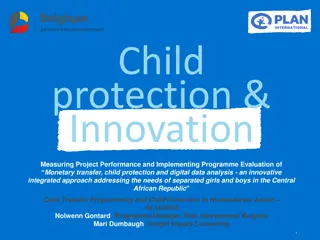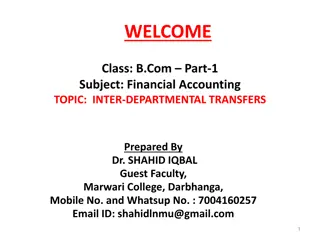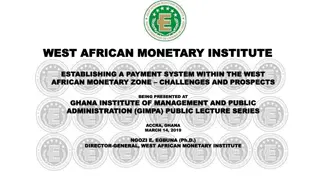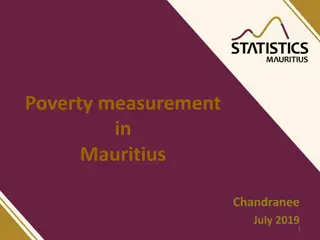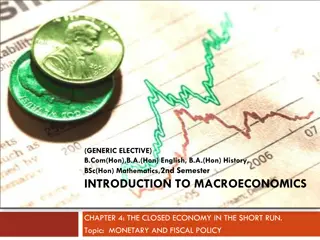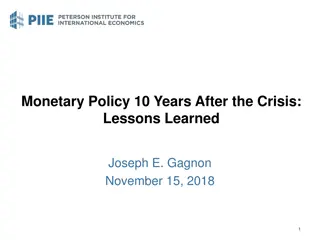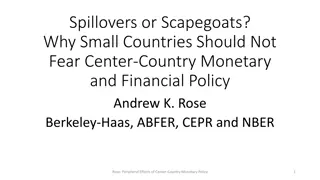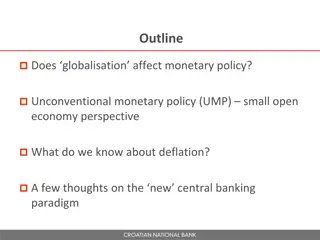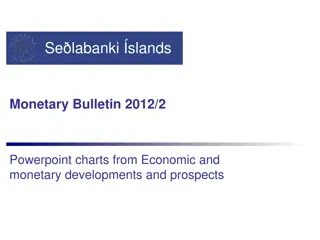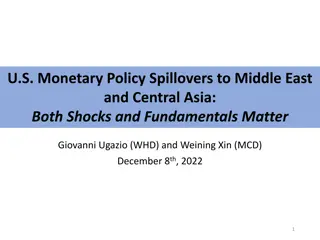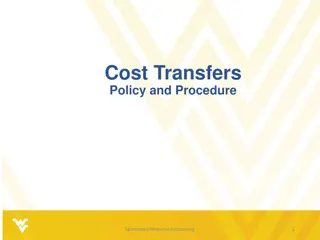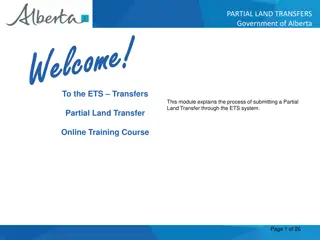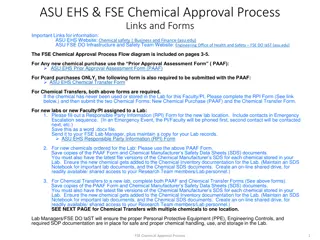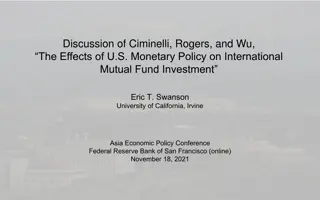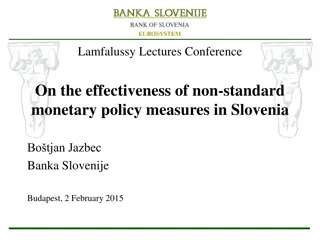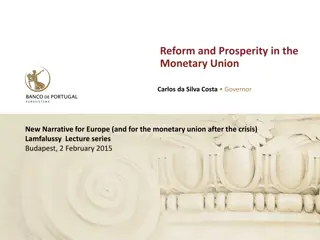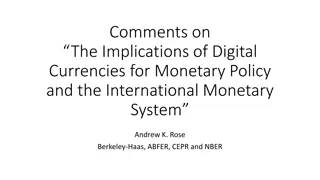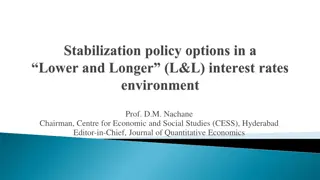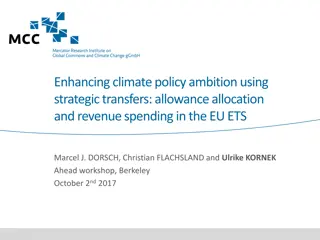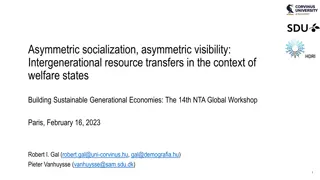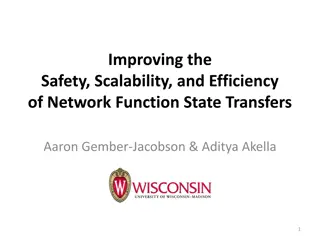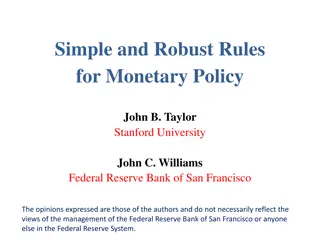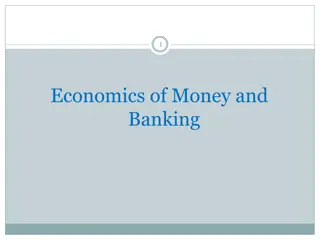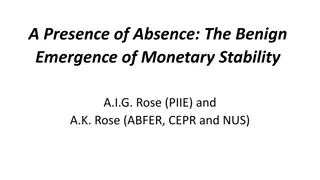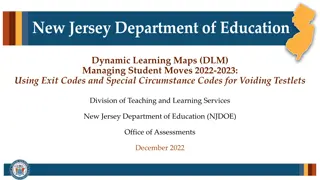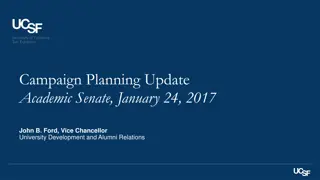Expenditure Transfers in Research
Understand the key concepts and procedures for managing cost transfers in research programs. Explore topics such as salary transfers, inter-program transfers, reimbursements, and toxic exposure fund requirements. Gain insights on executing financial tasks effectively and access resources for financi
2 views • 36 slides
Benefits of Coordinating Monetary Transfers for Beneficiaries
Coordinating monetary transfers provides various advantages for beneficiaries, including scalability, increased resources, speed, reduced duplication, improved targeting, better referral networks, enhanced links with social protection systems, improved communication, and harmonized approaches. This
4 views • 16 slides
Dynamic Transfer Types and Reporting: Enhancing Financial Operations
Explore the various types of dynamic transfers such as ODP, Sweep, ZBA, and more, enabling seamless movement of funds across accounts. Learn about excess balance transfers, maintain minimum transfers, and the intricacies of dynamic transfer reporting. Discover key strategies for efficient financial
1 views • 12 slides
Overview of Monetary Aggregates in Bosnia and Herzegovina
Image descriptions and explanations about monetary aggregates, money as a payment instrument, cash in circulation, deposit money, M1, M2, M3 categories, and monetary base. Additionally, details on net foreign assets, net reserves, and changes in monetary policy affecting currency board arrangements
1 views • 17 slides
Understanding Energy Stores and Transfers
Explore the concept of energy stores and transfers through various types such as gravitational potential, chemical, kinetic, and more. Learn about different energy transfer processes and how energy can be stored in various forms. Engage in tasks to enhance understanding and self-assessment of differ
7 views • 12 slides
Development of West African Monetary Institute Payment System
The West African Monetary Institute (WAMI) has been instrumental in establishing a payment and settlement system within the West African Monetary Zone (WAMZ). The institute's efforts have focused on promoting cross-border transactions and economic integration among member countries, with the ultimat
0 views • 46 slides
Understanding Cost Transfers in Research Operations Training
This training session covers various aspects of cost transfers in research operations, including different types, executing salary transfers, inter-program transfers, reimbursements, toxic exposure fund requirements, and financial updates for FY 23. Participants will gain insights into when and how
1 views • 36 slides
Guidelines for Student Transfers and IEPs in Oklahoma Schools
This document outlines procedures for student transfers in Oklahoma schools, specifically focusing on transfers for students with disabilities. It covers aspects such as transferring students with expired IEPs, revocation of disability recognition, and the process for move-in students within the sta
0 views • 7 slides
Exploring Energy Stores and Transfers in Science Lessons
Dive into the fascinating world of energy stores and transfers through engaging science lessons. Recall different energy stores, common energy transfers, and create flow diagrams to illustrate energy transfers in various scenarios. Explore gravitational, elastic, magnetic, electrostatic potential en
5 views • 9 slides
Understanding Cost Transfers in Sponsored Projects
Cost transfers, also known as expenditure transfers, are the process of moving expenses from one project to another. It is crucial to follow guidelines to ensure proper documentation and approval to avoid audit issues. Learn when cost transfers are acceptable or unacceptable, how to complete the nec
0 views • 6 slides
Saudi Arabian Monetary Agency (SAMA) Overview
The Saudi Arabian Monetary Agency (SAMA) serves as the central bank of Saudi Arabia with a focus on managing the country's monetary policy, maintaining price stability, and supervising financial institutions. Established in 1952, SAMA's functions include managing the national currency, foreign excha
0 views • 24 slides
Understanding Money and Monetary Policy in Economics
Money serves as a medium of exchange, store of value, and unit of account in an economy. It is vital for economic transactions and stability. The quantity of money is measured using concepts like liquidity and monetary aggregates. The demand for money is linked to the Quantity Theory of Money, which
2 views • 12 slides
Innovative Approach Addressing Child Protection and Monetary Transfer for Separated Girls and Boys in CAR
An integrated project in the Central African Republic by Plan International Belgium focuses on providing cash transfers, child protection services, and digital data analysis to address the needs of separated girls and boys. The project includes services like case management, family reunification, an
0 views • 9 slides
Managing Inter-Departmental Transfers in Financial Accounting
Inter-departmental transfers involve recording and charging costs from one department to another, with different pricing bases like cost-based and market-based transfers. Unrealized profits in transfers are adjusted using stock reserves. Entries are made at the selling price to include costs and pro
1 views • 7 slides
Challenges and Prospects of Establishing a Payment System in the West African Monetary Zone
The West African Monetary Zone (WAMZ) is striving to create a zonal payment and settlement system for cross-border transactions, aiming at economic integration for a common central bank and single currency. This initiative faces challenges but also holds promising prospects for regional financial in
3 views • 46 slides
Poverty Measurement in Mauritius: An Overview of Monetary and Non-Monetary Approaches
The measurement of poverty in Mauritius involves multidimensional assessments using both monetary and non-monetary approaches. The country's national priorities include poverty eradication, improving well-being, and ensuring inclusive growth. The monetary approach assesses poverty based on the Relat
1 views • 12 slides
Macroeconomic Policy Tools: Monetary and Fiscal Policy in Short Run
This chapter delves into the IS-LM model to illustrate the functioning of monetary and fiscal policies in influencing economic growth. It explains how these policies impact output, interest rates, and inflation rates in a closed economy in the short run. Monetary policy mainly operates through open
0 views • 18 slides
Monetary Policy 10 Years After the Crisis: Lessons Learned
Explore the evolution of monetary policy post-crisis, including definitions of monetary and fiscal policies, liquidity traps, and the Federal Reserve's actions during the Great Recession. Key lessons learned emphasize the importance of countercyclical policies, effective use of quantitative easing (
0 views • 8 slides
Small Countries' Resilience Against Center-Country Monetary Policies
Small countries should not fear the monetary and financial policies of larger center countries. This article discusses the potential spillovers of unconventional monetary policies by center countries, such as quantitative easing and negative nominal interest rates. It explores the concept of currenc
0 views • 39 slides
Globalisation's Impact on Monetary Policy and Central Banking Paradigm
Globalisation has reshaped monetary policy dynamics, influencing inflation pressures and the transmission of shocks across economies. Unconventional monetary policies in small open economies have challenged conventional theories, highlighting the complexity of managing monetary conditions. The inter
0 views • 24 slides
Economic and Monetary Developments Outlook Presentation 2012/2
This presentation provides insights into the economic and monetary developments and prospects in Iceland as per the Monetary Bulletin of 2012/2. It includes charts depicting the economic outlook and key uncertainties faced by the region. The slides offer a comprehensive overview of the current econo
0 views • 84 slides
U.S. Monetary Policy Spillovers to Middle East and Central Asia: Shocks and Fundamentals Impact
The research explores the impact of U.S. monetary policy spillovers on the Middle East and Central Asia regions, focusing on shocks and country fundamentals. It examines historical data, model analysis, and the 2022 tightening effects. The study reveals that both contractionary monetary policy shock
0 views • 20 slides
Overview of Cost Transfers in Sponsored Research Accounting
Cost transfers involve the reassignment of expenses from one account to another in sponsored research accounting. Timely, supported, and properly documented transfers are essential to ensure compliance with federal requirements and internal controls. This overview highlights the definition, purpose,
0 views • 14 slides
Understanding Partial Land Transfers in Alberta
The module explains the process of submitting a Partial Land Transfer through the ETS system in Alberta. It covers initiating and submitting transfers, concurring to transfers, and retrieving final documents. It also includes steps for logging in to ETS, searching agreements, and more. Prior knowled
0 views • 26 slides
ASU EHS & FSE Chemical Approval Process Guidelines
Detailed guidelines and forms for the chemical approval process at ASU, including links to important resources, forms for new chemical purchases and transfers, responsibilities for lab managers, and procedures for chemical transfers. The process involves completing forms such as the Prior Approval A
0 views • 5 slides
Understanding the Effects of U.S. Monetary Policy on International Mutual Fund Investment
This paper discusses the impact of U.S. monetary policy shocks on international mutual fund flows, distinguishing between pure monetary policy shocks and information shocks. It examines how these shocks influence mutual fund investments and explores the differences in reactions to the Federal Reserv
0 views • 9 slides
Challenges and Solutions in Implementing Non-Standard Monetary Policies in Slovenia
The decoupling of real and financial cycles in Slovenia, attributed to a balance-sheet recession and unsustainable debt-financed growth, poses challenges for monetary policy effectiveness. Credit decline persists despite economic growth, hindered by risk-averse banks and limited market for alternati
0 views • 14 slides
Reform and Prosperity in the Monetary Union: A Path to Sustainable Growth
The lecture series highlights the symbiotic relationship between the Monetary Union and economic growth, emphasizing the need for sustainable economic policies at both national and European levels. It discusses the role of Monetary Union in facilitating sustainable development while addressing the c
0 views • 9 slides
Insights on Digital Currencies: Implications for Monetary Policy and the International System
Reflecting on the implications of digital currencies for monetary policy and the international monetary system, the comments by Andrew K. Rose highlight potential effects on capital mobility, currency substitution, and the evolution of money. Emphasizing the small size of cryptocurrencies compared t
0 views • 18 slides
Challenges and Alternatives in Monetary Policy During Economic Depressions
The zero lower bound (ZLB) poses challenges to conventional monetary policy during severe depressions, leading to prolonged periods of low interest rates. Mainstream macroeconomic theory falls short in providing effective guidance, prompting the exploration of alternate mechanisms such as taxation,
0 views • 29 slides
Strategic Transfers for Enhancing Climate Policy Ambition in EU ETS
This study explores the use of strategic transfers, allowance allocation, and revenue spending in the EU ETS to enhance climate policy ambition. Motivated by the EU's goal of reducing emissions by 80% by 2050, the research delves into transfer decisions, cap-setting roles, challenges for decarboniza
0 views • 21 slides
Asymmetric Socialization and Resource Transfers in Welfare States
Exploring intergenerational resource transfers in the context of welfare states, this study examines three main channels: families, the government, and markets. It delves into different institutional arrangements governing asset-based reallocations, public transfers, and familial transfers. The leve
0 views • 12 slides
Challenges and Considerations in the Junior Tag Transfer Program
Challenges faced by NDOW staff include issues with tag transfers, administrative burden, disadvantaged minors, black market risks, and family dynamics. Suggestions for potential program considerations include limiting transfers, capping yearly transfers, and involving long-standing customers.
0 views • 7 slides
Enhancing Network Function State Transfers
Explore methods to improve the safety, scalability, and efficiency of network function state transfers. Addressing issues related to NF deployments, state management frameworks, and transfer mechanisms. Discuss challenges like safety, efficiency, and scalability with solutions such as re-routing flo
0 views • 16 slides
Simple and Robust Rules for Monetary Policy Overview
This document discusses the historical background, empirical experience, characteristics of simple rules, robustness, and the comparison between optimal control and simple rules in monetary policy. It explores the evolution of policy rules from Smith and Ricardo to modern approaches, emphasizing the
0 views • 22 slides
Understanding Wealth Accounts: Challenges and Models in NTA
Wealth accounts in National Transfer Accounts (NTA) are vital for classifying wealth by sector and age group. Challenges in constructing wealth accounts include data availability and modeling transfers. Public and private asset transfers, revaluations, and capital transfers are crucial components to
0 views • 14 slides
Understanding Economics of Money and Banking
This course delves into monetary theories, the financial system, bank management, and regulation. The aim is to provide a comprehensive understanding of monetary policy, financial systems, and their impact on the economy. Through interactive lectures and discussions, students will grasp the fundamen
0 views • 30 slides
The Emergence of Monetary Stability in a Changing Economic Landscape
Amidst global economic shifts, A.I.G. Rose and A.K. Rose explore the emergence of monetary stability in their publication "A Presence of Absence." They delve into the rise of effective monetary policies, the impact of inflation targeting, and the evolution of stable monetary regimes. Through insight
0 views • 36 slides
Managing Student Moves and Transfers in DLM 2022-2023
This content provides detailed guidance on managing student moves and transfers within the Dynamic Learning Maps (DLM) system for the 2022-2023 academic year. It covers the use of exit codes, special circumstance codes, key dates for assessments, required training materials, New Jersey specific guid
0 views • 22 slides
Campaign Planning Update: Academic Senate, January 24, 2017
This update covers the campaign planning process at the Academic Senate, focusing on objectives, volunteer engagement, monetary goals, nucleus fund details, non-monetary goals, and next steps. Key highlights include identifying cross-cutting themes, engaging faculty and volunteers, setting a monetar
0 views • 9 slides

